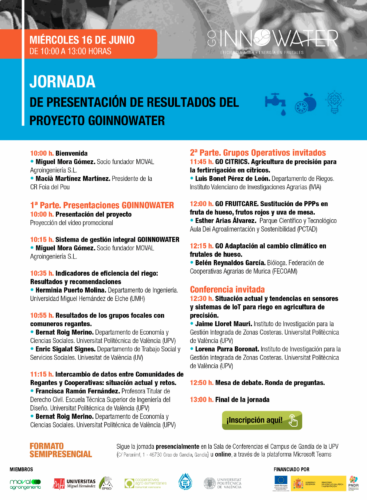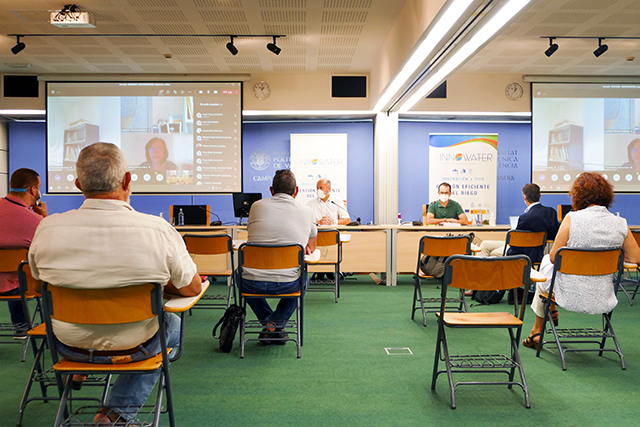Wednesday, June 16th saw the presentation of the findings and conclusions of the GOINNOWATER Project. The aim of the session, which was carried out in a hybrid format, was to present the major findings obtained after more than two years of collaboration, to the members of the university, scientific and business community.

With this in mind, the conference was structured in three parts. The first part saw the presentation of the results of the integral irrigation management system implemented by the Foia del Pou Irrigation Community,as well as the recommendations of the irrigation efficiency indicators and the results of the focus groups made up by the community members. Likewise, operational and legal issues were raised that should be taken into account in the exchange of agricultural data between irrigation communities and cooperatives.

The second part of the session offered an overview of the progress made by three other Operational Groups; GO CITRICS, GO FRUITCARE and GO Adaptation to Climate Change in Stone Fruit Trees, who share objectives, subject areas or reference crops with GOINNOWATER.
The final presentation of the conference dealt with the current situation and trends in sensors and IoT systems for irrigation in precision agriculture, given by Lorena Parra, expert in sensors from Campus Gandia.
GOINNOWATER
It is worth recalling that the GOINNOWATER Project, underway since 2019, is an innovation transfer initiative co-financed by the European Agricultural Fund for Rural Development (EAFRD) and the Government of Spain, as part of the National Rural Development Program (PNRD). Also taking part in the program alongside the Universitat Politècnica de València (UPV), directed by Bernat Roig of Campus Gandia, and the Miguel Hernández University of Elche (UMH), are the Foia del Pou Community of Irrigators, the Agro-Food Cooperatives of the Valencian Community and Moval Agroingenieria SL.
This project, which aims to increase crop productivity by improving irrigation water management and energy consumption, promotes the development of a program that measures the efficiency of water and energy use, applying comparative evaluation techniques to improve productivity, profitability and sustainability of irrigated fruit farms.
SELECCIÓN DE INDICADORES PARA MEDIR LA EFICACIA EN EL USO DE AGUA DE RIEGO
The latest research findings published by the project focus on the application of a new multi-criteria approach based on the Analytical Hierarchical Process (AHP) technique and the participation of experts to evaluate the efficiency of irrigation water usage in citrus orchards, with the ultimate goal of helping irrigation communities in the irrigation decision-making process.
The methodology includes an indicator selection process adapted to the particular case of irrigated citrus fruits in the Mediterranean area of Spain. The results obtained in a preliminary analysis show a high range of variability between plots for the main indicators. The causes have been analyzed and the evidence suggests that full-time farmers are more efficient than part-time farmers, and that the size of the plot has no correlation with the efficiency indicators.
More information: Poveda-Bautista, R.; Roig-Merino, B.; Puerto, H.; Buitrago-Vera, J. Assessment of Irrigation Water Use Efficiency in Citrus Orchards Using AHP. Int. J. Environ. Res. Public Health 2021, 18, 5667. https://doi.org/10.3390/ijerph18115667
Source: Laida Frasquet, Reporter at the Office of Communications


